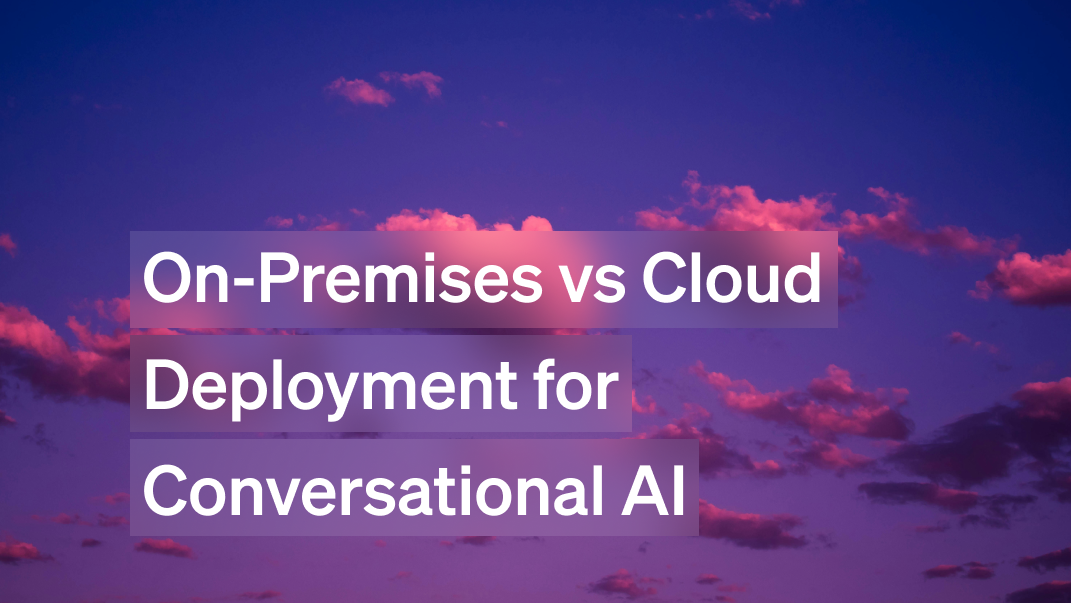Conversational AI reshapes how enterprises connect with customers, simplify operations, and tackle industry challenges. By integrating innovative technology, these platforms enhance efficiency and create more personalized, meaningful interactions at scale.
For enterprises in highly regulated sectors like banking, telecommunications, and government, selecting the right conversational AI platform requires careful consideration. Beyond basic functionality, businesses need solutions that support complex workflows, adapt to changing demands, and safeguard sensitive data. A strong platform can differentiate between delivering seamless customer experiences and falling short of expectations.
In this blog, we’ll explore seven leading conversational AI platforms designed to meet the demands of large-scale enterprises. Each platform offers unique capabilities to elevate customer engagement and operational performance, from advanced customization to compliance-driven features. Whether refining your current approach or starting fresh, this guide will help you find the right solution to drive success.

What is Conversational AI?
Conversational AI is a generative AI (GenAI) technology that facilitates human-like interactions through voice or text interfaces. These systems mimic natural conversations, enabling users to engage with businesses, devices, or services in a way that feels intuitive and seamless.
Conversational AI technology leverages artificial intelligence (AI), natural language processing (NLP), and machine learning to interpret user input, understand context, and generate accurate, meaningful responses. NLP allows systems to grasp language nuances-recognizing intent, tone, and sentiment-while machine learning enables continuous improvement through exposure to real-world interactions.
From answering customer queries to automating internal processes, conversational AI transforms interactions into dynamic, personalized exchanges. This technology empowers businesses to build solutions that address immediate needs and anticipate future demands, encouraging stronger connections with users at every touchpoint.
How Does Conversational AI Work?
Conversational AI operates through a structured workflow that transforms user input into meaningful, context-aware responses. The process begins with data input, where the system captures what the user says or types, whether it's a simple question or a detailed request.
Next comes natural language understanding (NLU), a critical step powered by artificial intelligence and natural language processing (NLP). NLU allows the system to analyze and interpret the user's words, identify intent, extract key information, and understand the overall context of the interaction. This step ensures the AI can grasp the user's wants and how best to respond.
Once the input is understood, the system moves to response generation. Here, machine learning models and pre-defined business logic work together to craft a reply that aligns with the user's intent and the organization’s objectives. Finally, the AI delivers the reply through the appropriate output channel, such as a chat interface, voice assistant, or messaging platform.
Machine learning plays an essential role in enhancing AI chatbot adaptability. By learning from past interactions, the system improves its ability to handle diverse inputs, anticipate user needs, and maintain smooth, natural conversations. This dynamic process enables businesses to deliver consistent, high-quality, genuinely conversational interactions.
Rasa further elevates this technology through our CALM (Conversational AI with Language Models) framework, which combines the power of generative AI with enterprise-grade control. Unlike rigid or black-box systems, CALM empowers businesses to create adaptive, context-aware assistants that handle unexpected inputs seamlessly while maintaining reliability. This approach ensures conversations remain fluid, accurate, and aligned with organizational goals.
Conversational AI Use Cases to Explore
Conversational AI opens up many possibilities for businesses to enhance customer interactions and improve operational efficiency. These platforms provide value across industries, from automating repetitive tasks to delivering personalized experiences. Let’s explore some of the most impactful use cases.
Improving Customer Support Efficiency
Customer service often requires quick, accurate responses to common queries-a perfect fit for conversational AI. AI agents and virtual assistants handle repetitive inquiries like:
- Resetting passwords
- Tracking shipments
- Resolving billing issues
- Contact center FAQs
For example, a telecommunications company could deploy a virtual assistant to guide users through troubleshooting steps for connectivity issues, significantly reducing wait times for human agents. These automated tools streamline support processes and elevate customer satisfaction by delivering instant solutions.
Driving Lead Generation and Sales Conversions
Conversational AI doesn’t just serve customers; it drives revenue, too. By interacting with prospects in real-time, AI platforms:
- Qualify leads by gathering essential information, such as email and interests
- Suggest products or services tailored to user preferences
- Automate follow-ups to keep leads engaged
Retail assistants might recommend add-ons during checkout to increase basket size. Meanwhile, a virtual assistant in real estate could instantly schedule viewings or share detailed property information, reducing delays and improving conversion rates.
Streamlining Internal Processes
Internally, conversational AI simplifies workflows in many departments like HR and IT, boosting productivity while saving time. For example:
- HR automation: Assistants can manage time-off requests, onboarding new employees, or direct staff to relevant resources.
- IT support: Bots can resolve frequent issues, like resetting passwords or troubleshooting connectivity problems, without requiring manual intervention.
- Finance assistance: AI can automate expense report submissions, track budget approvals, and answer employee questions about payroll or reimbursement policies.
- Procurement assistance: Virtual assistants can guide employees through supply requests, vendor approvals, or contract inquiries, reducing bottlenecks in purchasing processes.
- Training and development: AI tools deliver on-demand training modules, recommend courses based on career goals, and quiz employees to reinforce learning outcomes.
For example, IT assistants can guide employees through software installations step by step, reducing team workloads and allowing them to focus on higher-value tasks.
Enhancing Customer Satisfaction and Retention
Happy customers tend to stick around, and conversational AI builds loyalty by delivering personalized experiences.
By analyzing user data, these platforms can:
- Offer relevant product recommendations
- Send reminders or alerts specified to individual preferences
- Address recurring issues proactively
For example, a healthcare provider might use an AI assistant to remind patients about appointments or medication schedules. This level of attentiveness improves satisfaction and strengthens trust, fostering long-term relationships.

7 Conversational AI Platforms to Consider for 2025
With numerous conversational AI platforms available, choosing the right one for your business can feel overwhelming. Each platform offers unique features, capabilities, and industry applications. Below, we highlight seven platforms worth exploring in 2025, focusing on their strengths and suitability for various enterprise needs.
1. Rasa
Rasa is a flexible, enterprise-grade platform designed to meet the demands of highly regulated industries such as BFSI (Banking, Financial Services, and Insurance), telecommunications, healthcare, and government organizations. Our on-premise deployment options ensure data security and compliance, making us a trusted choice for enterprises with strict regulatory requirements.
Key highlights:
- Conversation repair capabilities keep interactions on track, even when users deviate from expected paths.
- LLM-agnostic approach allows businesses to choose and switch between language models.
- Seamless integration with existing workflows for scalable, reliable results.
- Multimodal support enables assistant development that handles text and voice interactions, improving engagement and accessibility.
- Built-in multilingual capabilities allow businesses to deliver consistent, localized experiences to users across global markets.
2. IBM Watsonx Assistant
IBM Watsonx Assistant excels in enterprise integrations and multilingual support, making it a versatile choice for global organizations. Its AI-driven features allow businesses to automate customer support, analyze interaction data, and provide personalized user experiences.
Key highlights:
- Integrates with tools like CRMs and knowledge bases.
- Offers multilingual capabilities to support global audiences.
- Provides advanced analytics to optimize customer interactions.
3. Cognigy.AI
Cognigy.AI's no-code interface simplifies conversational AI implementation, allowing enterprises to deploy virtual assistants quickly without extensive developer involvement.
Key highlights:
- Advanced automation to streamline customer interactions.
- Omnichannel support for unified communication across email, SMS, and social media.
- Suitable for businesses aiming to scale operations efficiently.
4. Yellow.ai
Yellow.ai focuses on automation and caters to diverse industries like e-commerce and healthcare. Its platform enables businesses to create dynamic virtual assistants that handle various use cases, from customer support to lead generation.
Key highlights:
- Scalable architecture for high-volume operations.
- AI-driven workflows to ensure seamless user experiences.
- Flexible applications for industries with unique demands.
5. Boost.ai
Boost.ai specializes in self-service AI for customer support, offering scalability for large organizations with high interaction volumes.
Key highlights:
- Rapid deployment to improve customer engagement quickly.
- Analytics features that provide actionable insights for optimization.
- Designed for ease of use, reducing implementation complexity.
6. Kore.ai
Kore.ai focuses on automating business workflows and internal enterprise use cases, such as HR and IT support.
Key highlights:
- Robust tools for designing voice and text interfaces.
- Streamlined processes to enhance employee productivity.
- Ideal for internal operations and external customer interactions alike.
7. Amazon Lex
Amazon Lex leverages its integration with AWS services to create voice and text conversational interfaces.
Key highlights:
- Seamless scalability for businesses already using AWS infrastructure.
- Cost-efficient deployment with powerful AI-powered tools.
- Ideal for enterprises needing natural language understanding at scale.
Why Rasa May Be the Best Choice for Your Business Needs
At Rasa, we’ve built a platform to address enterprises' unique challenges when implementing conversational AI. Unlike one-size-fits-all solutions, Rasa combines flexibility, scalability, and security to help organizations deploy assistants customized to their needs while maintaining full control over their data and workflows.
Flexibility Without Complexity
With Rasa Studio, our intuitive no-code platform, teams can effortlessly design and customize conversational flows. This ensures that technical and non-technical teams can contribute to building AI assistants that align with business goals. Whether automating customer service or optimizing internal processes, the Rasa Platform adapts to your requirements.
Here’s what makes Rasa unique:
- Customizable workflows: Build assistants that align with your business logic and user needs.
- No-code simplicity: Rasa Studio empowers you to design and iterate quickly without heavy developer involvement.
- Support for complex use cases: Handle nuanced, industry-specific challenges with ease.
Secure Solutions for Regulated Industries
Compliance and security are critical for industries like BFSI, telecommunications, and healthcare. Rasa provides on-premise deployment options, ensuring your organization retains complete control over sensitive data while meeting global regulatory requirements.
With Rasa, you can:
- Keep data safe with infrastructure that meets compliance standards like GDPR and HIPAA.
- Deploy securely in high-regulation environments without compromising functionality.
- Maintain control over your assistant’s behavior and data access.
Freedom to Choose Your LLM
Rasa’s LLM-agnostic approach ensures enterprises are not locked into a single vendor. You can choose and adjust the language models that best fit your goals. This flexibility helps organizations balance innovation with cost-efficiency while staying ahead of AI advancements.
Key benefits include:
- Integration with any LLM allows you to stay on the cutting edge.
- Switch models easily as technology evolves or priorities change.
- Cost control by selecting the most efficient models for specific use cases.
Seamless, Intelligent Conversations
Rasa takes the complexity out of managing natural dialogues with features like conversation repair. This ensures your assistants handle unexpected user behavior gracefully, maintaining smooth interactions even when users deviate from the script.
What sets Rasa apart:
- Dynamic adaptability: Recover from interruptions, topic changes, or incomplete inputs.
- Context retention: Keep conversations flowing naturally without starting over.
- Enhanced user satisfaction: Deliver seamless, frustration-free interactions at scale.
Built for Enterprise Excellence
Rasa is designed for enterprises seeking to balance AI capabilities with security and scalability. Our platform supports complex workflows while remaining simple, ensuring organizations can deploy virtual agents that deliver meaningful outcomes without sacrificing control.
By combining customization, LLM-agnosticism, and enterprise-grade security, Rasa gives you the tools to build conversational AI solutions that align with your unique business goals-today and in the future.
Choose the Right Conversational AI Platform for Your Enterprise
Selecting the right conversational AI platform is crucial to delivering exceptional customer experiences and optimizing internal operations. The best platform should align with your organization’s unique needs, offering flexibility, scalability, and security to support your goals now and into the future.
Rasa stands out as a leader in conversational AI, combining customization, enterprise-grade security, and an LLM-agnostic approach. Whether you’re focused on creating personalized customer interactions, automating complex workflows, or ensuring compliance in regulated industries, our platform gives you the tools to succeed.
Ready to transform how your enterprise engages with customers and streamlines processes? Connect with Rasa today and see how we can help your business build smarter, scalable AI solutions.




